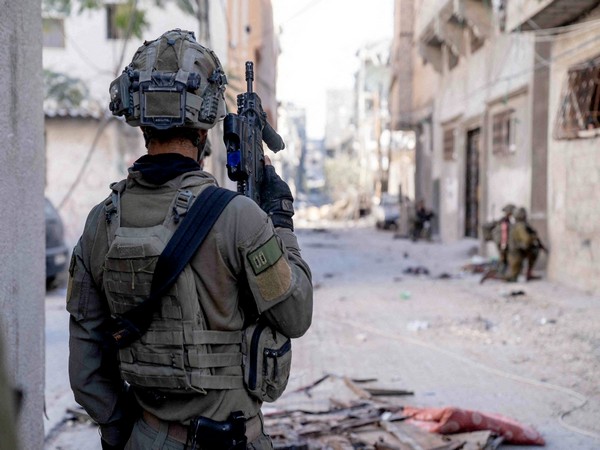Tel Aviv [Israel], December 18: Israel opened a direct crossing for aid into Gaza for the first time in its more than two-month-old war on Hamas on Sunday but also stepped up attacks on the Palestinian enclave, saying military pressure was the only way its hostages would be freed.
The Israeli assaults took place amid fierce fighting the length of the coastal strip, according to residents and militants, with communications down for a fourth day, making it hard to reach the wounded.
Hopes for peace had been raised on Saturday when a source said Israel's spy chief had spoken on Friday with the prime minister of Qatar, which mediated hostage releases in return for a week-long ceasefire and the freeing of Palestinian prisoners.
Two security sources from Egypt - another mediator - said on Sunday Israel and Hamas were both open to a renewed ceasefire and hostage release, though disagreements remained on how it would be implemented.
"We are open to any efforts aimed at ending the Israeli aggression. This is the ground for any discussion," Hamas official Sami Abu Zuhri said when asked for comment on the Egyptian statement."
In a further positive sign, the Kerem Shalom crossing between Israel and Gaza opened for aid trucks on Sunday for the first time since the outbreak of war, officials said, in a move to double the amount of food and medicine reaching Gazans.
But Israeli authorities said they were determined to fight on to eliminate Hamas, which has run Gaza since 2006 and is sworn to Israel's destruction.
"It is important for me to make clear, that the IDF (Israeli Defence Forces) is determined to complete the task of dismantling Hamas," Israeli military spokesman Rear Admiral Daniel Hagari told reporters in Tel Aviv.
A day earlier, Israeli Prime Minister Benjamin Netanyahu appeared to signal an openness to negotiations but vowed to maintain intense military pressure.
DEADLY STRIKES
Israeli strikes on the Jabalia refugee camp in northern Gaza killed 90 Palestinians on Sunday, Gaza's health ministry spokesman told Reuters. There was no immediate Israeli response.
Another missile attack on a house belonging to the Shehab family killed 24 people, Hamas Aqsa radio said.
The son of Dawoud Shehab, spokesman of Hamas-ally Islamic Jihad, was among the dead, an official from the group told Reuters.
A medic said dozens of people had been killed or wounded in the Shehab family home and nearby buildings.
"We believe the number of dead people under the rubble is huge but there is no way to remove the rubble and recover them because of the intensity of Israeli fire," he said by telephone.
In Deir al-Balah, central Gaza, medics said 12 Palestinians had been killed and dozens wounded, while in Rafah in the south, an Israeli air strike on a house left at least four people dead.
People rushed to the building to rescue those trapped under the rubble. The sound of the explosion was "as powerful as an earthquake", Mahmoud Jarbou, who lives nearby, told Reuters.
Israel said it had operated against militant targets.
Around 19,000 Palestinians have been killed, according to Gaza health officials, since Oct. 7 when Hamas militants killed 1,200 people, according to Israeli authorities, and captured 240 hostages in their surprise raid.
ISRAELI LOSSES
The accidental killing of three of the hostages on Friday by Israeli forces has increased pressure on Netanyahu to secure the release of the others, but Hamas has said it will not negotiate any exchange "unless the aggression against our people stops once and for all".
Hundreds of people attended the funeral of one of the three, 26-year-old Alon Shamriz, in central Israel on Sunday.
Standing over his flag-draped coffin, his mother, Dikla, paid tribute.
"My child, you were strong, determined, smart. You were a hero. You survived 70 days in hell. I know you felt us all the time, the way we felt you. Another moment and you would have been in my arms," she said as family and friends wept.
Signs reading "S.O.S." and "help, three hostages" in Hebrew were found on the walls of a Gaza building where the three had been hiding before their deaths, Israel's military said.
It earlier said 121 soldiers had been killed since the ground campaign began on Oct. 27, when tanks and infantry began to push into Gaza's cities and refugee camps.
Netanyahu read out a letter at his weekly cabinet meeting which he said was written by relatives of dead soldiers.
"You have a mandate to fight. You do not have a mandate to stop in the middle," he quoted them as saying, responding: "We will fight to the end."
The toll is already almost twice as high as during a ground offensive in 2014.
The Israeli military said its troops had found weapons and a tunnel used by militants to attack troops in Shejaia, a suburb near Gaza City, and destroyed a weapons storage facility in the home of a Hamas operative.
The armed wing of Islamic Jihad said its fighters targeted Israeli forces in Gaza City with mortar bombs, while residents said Israeli tanks shelled villages in central Gaza, where fighting has intensified in recent days.
In Khan Younis in southern Gaza, residents reported hearing Israeli planes and tanks bombing and shelling and the sound of rocket-propelled grenades, apparently fired by Hamas.
An Israeli tank shell hit the maternity building inside the Nasser Hospital in Khan Younis, killing a 13-year-old girl, health officials said. The shell blasted through the wall but did not explode, Ashraf Al-Qidea, the spokesman of the Gaza health ministry told Reuters. There was no immediate Israeli response.
The Israeli military said it had killed seven militants in an air strike on Khan Younis and found rocket manufacturing parts and three tunnel shafts near a school used as a shelter.
Israel says it goes to great lengths to avoid hitting civilians.
Source: Fijian Broadcasting Corporation

